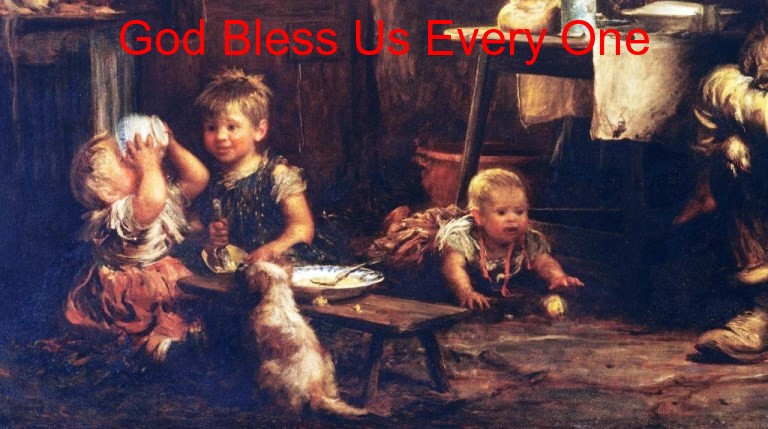A first-hand account of life in a Liverpool ‘Court’ in the 19th Century
First published in the Porcupine December 1862
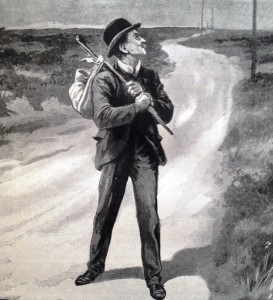 It’s a good while ago and was in a year that Christmas Day fell upon Saturday, when I was compelled to spend it in a Liverpool Court. I was brought up and served my time in a small village in Cheshire. Eight years after I was out of my time I fell out with my master and in hot blood threw up my place and came to Liverpool to look for work. I had a wife and four children. It was a hard job to leave the house where all these had been born and the village so dear to me in many ways; but it had to be done, and there was no help for it.
It’s a good while ago and was in a year that Christmas Day fell upon Saturday, when I was compelled to spend it in a Liverpool Court. I was brought up and served my time in a small village in Cheshire. Eight years after I was out of my time I fell out with my master and in hot blood threw up my place and came to Liverpool to look for work. I had a wife and four children. It was a hard job to leave the house where all these had been born and the village so dear to me in many ways; but it had to be done, and there was no help for it.
I recollect that I made very short work of the parting, and I tried to laugh whilst I shook my wife’s hand, and at the same time the tears were pumping up and nearly blinding me.
I soon got work in Liverpool and I lodged with a shopmate, for it was some time before I could afford to send for my wife and family. But I managed to get them here before Christmas: I had worked hard for this. When they did come the job was to find a house for them. I had no time to look after it, and my wife was quite strange to the town, its ways and its people. As I was working at a yard at the south end, the house, to be useful to me, must be near to my work; so, after a great deal of hunting, to try and get anything at about our price, and for want of anything better, we took a house in a long court, not such a way off St James’s Market. The place didn’t look so dirty as many courts we had seen, for there was a good fall in it. The houses were single, straight up and down and not badly built; but, for want of drainage, the cellars were very damp. For all this, people lived in these holes, – at least on one side of the court, – although there was no entrance for them from the court, and they were lighted by very small windows. There were, besides, several things I did not like about the court and people; but my wife had been knocked about so to get any place to put our furniture into, that I felt it would go against her grain if I made any strong objections. Besides, on talking it over, I found she was not in love with the place, but she must have some sort of place at once, until she could look about her.
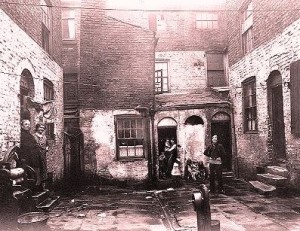
We went into our first house in Liverpool on the Monday before Christmas Day. I thought, as I went down from work on the Monday night, and crushed by the crowds of all sorts that choked up the narrow entrance to ______ Court, “This is very different from your little cottage in the country, Billy, my boy,” but it was no use crying over shed milk. Here I was and I’d have to stay, and when one’s in for thing, the best way is to stick to, and work one’s self out. My wife had got the house very tidy, but I was sorry for my children. There was, it appeared, a dreadful rough set of children about, and on no account were mine allowed to go out and play with them, so they had been prisoners all day, and looked very different to what they used to do when they came clambering over the stiles to meet me as I left the yard. “This won’t do for you, Billy,” says I to myself, “and, what’s more, it shan’t.”
When the children were got off to bed, then it was that I heard what sort of place we had got into. Why, before my wife had got her furniture put into any sort of order, she had been visited by half the women in the court – in a friendly way, of course. One and all wished her good luck; some wanted to borrow pans and mugs; some wished her to join them in a subscription to bury a child that was dead in the top house, others that had joined for a little sup of drink, wished her to taste with them; some wanted her to subscribe to a raffle for a fat pig, which had been fed in the cellar where it now was, and that was right opposite to the house in which I lived. We had not been talking long before there was a row in the court, and on looking out, I saw two men stripped to the waist, fighting in style.
Every door was open, and here and there heads were pushed out of windows; and as the men slashed at each other the other women and children cried and screamed dreadfully. On enquiry, I found this to be the father and son. The father worked on board some steamer and only came home once a week. Every time he came ashore he got something to drink, quarrelled with his wife, and turned her out of doors. The son stuck up for the mother, and father and son settled differences by a fair stand-up fight. Each has his partizans, and I saw that a good many fights would likely spring out of this, so I shut the door and sat down with my wife to think of the best way of getting out of the court. We were booked for a week, anyhow.
My wife had a deal to put up with for the next few days from the people, because she would not go about with them nor drink with them, and she was in great trouble about her children. Out of the house the little things would go when they got the chance, and friendly with the other children in the court they were sure to be in spite of all remonstrances. How could it be any way else? All day long the court, she told me, was very lively, for there were some men who never seemed to work. They went out to get drunk and came home to fight, and hadn’t time for much else. Some of them would come home drunk in the middle of the day, and others never turned out until it was getting dark. The words which our little children were compelled to listen to, the tricks they were sure to see played, the way in which the mothers behaved to their little ones, the sort of play they allowed them to indulge in, the sort of food that was given to them, the way in which they had to eat it, the dirty and ragged state in which they were always seen, and then, beyond all, the fierce brawling on men and women all day long, made my wife and myself miserable, and out of this nest of devilment, we determined to get.
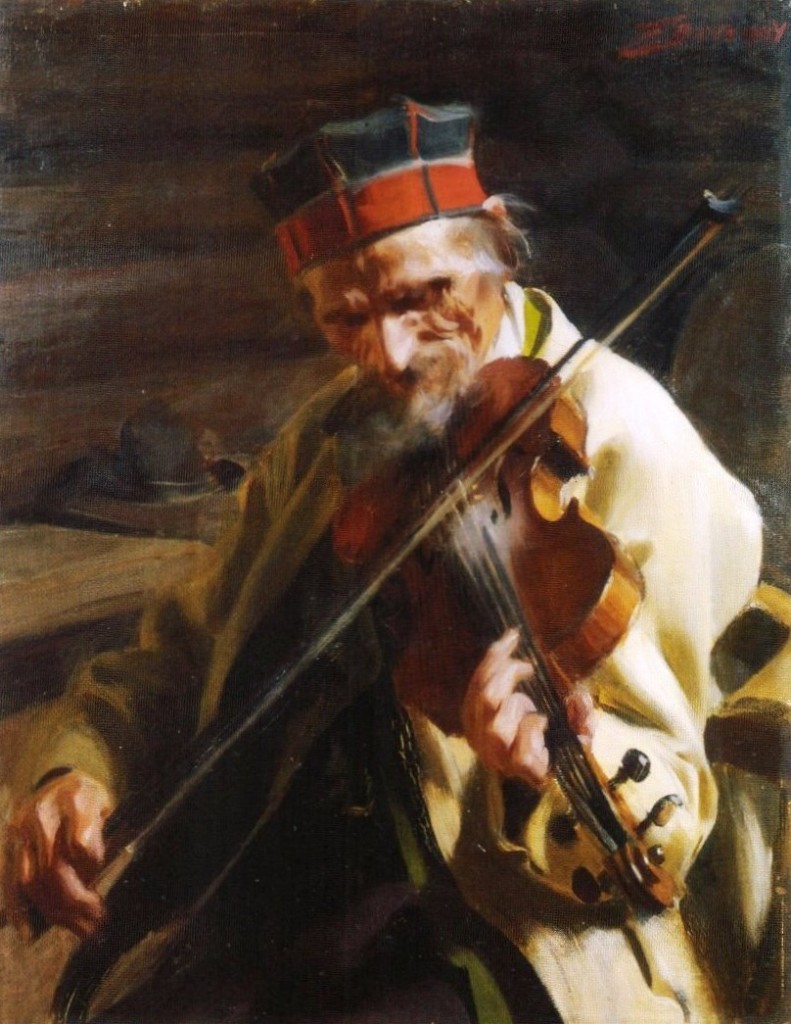 But if the court was lively on the first night, what ought to be said of it on Christmas Eve? There were two raffles to come off. At one, that for the pig, there was a fiddler. He sat on the stairs and men and women danced in a rattling way to his scraping. The woman who was raffling the pig came to my house to see if we would let our little girl fetch the ale for them. It was only from the beer-house at the top of the court, and she wouldn’t have troubled us only her little lad had been shoved into the fire and had got his arm badly burnt!
But if the court was lively on the first night, what ought to be said of it on Christmas Eve? There were two raffles to come off. At one, that for the pig, there was a fiddler. He sat on the stairs and men and women danced in a rattling way to his scraping. The woman who was raffling the pig came to my house to see if we would let our little girl fetch the ale for them. It was only from the beer-house at the top of the court, and she wouldn’t have troubled us only her little lad had been shoved into the fire and had got his arm badly burnt!
We both refused to allow the child to be put to such work, and with that the woman began to storm at us like a fury, and before half an hour had past, two panes in our room window were broken.
As the night got on I was almost afraid to go to bed. The other raffle had got to work, and, although it was merely for a handkerchief, and was confined to young people and children, there was a complete riot over it. Men began to roll home now, mostly in a drunken state, and carrying something for the feast of tomorrow. Children were running about or were being kicked about, and far into the night we could hear rows, breaking of crockery, mingled with screams of children and curses of parents.
I looked out just before twelve o’clock, as some singers had come into the court, they sang “while shepherds watched their flocks by night,” and sang it well too. I’ll never forget the picture I saw there then. The court was in a manner of speaking still. The raffle people came to the door. Out of many houses children ran and clustered round the singers. No one spoke above his breath, as the four young men and two women told the story of the Child that was born in Bethlehem. One thing jarred on my ear, and that was the hissing from the frying pans which were now under way in several houses. I had heard at my country home the singers at Christmas time, but I don’t think the song ever touched me so much as it did on this night. I’ve often wondered whether the people in this court ever heard the glad tidings of great joy in any other way.
Christmas morning opened with a child being scalded in one of the houses, and this accident roused the whole court. Then began the bustle of getting dinners ready and sending them to the bake house. Those who had got a goose took good care to tell everybody, for you could hear children going about begging or borrowing one thing or another in order that the goose might be cooked. Onions were in great request, and little children sat down on the steps to talk about what they were going to have for dinner. It amused me very much to hear women shouting at each other from door to door as to what sort of a fuddle there was at the raffle, and what they had got for their Christmas dinners.
The house next door to that in which I was unfortunately fixed was unoccupied, and a heap of boys who lived in the courts had taken possession of this, and were preparing to perform a Christmas piece. Those who could manage to get any fancy dress had done so, and dashed up and down the court to show themselves, and were the object of much curiosity to many grown-up people. The play was to come off in the afternoon, and all the fore part of the day was spent in “practising.” Crashing of sticks, stamping of feet, firing pistols, and shouts of robbers, were what fell to my lot to hear of this practising. There seemed to be opposition companies, but those in the house part had the best of it. They charged a halfpenny each for admission, and when the boys, girls, women, or men got in, they might please themselves what lot they remained with. What interest people could have in seeing these little ruffians strut and bellow, one might well wonder at, but the people had had their dinners, and anything, as they said, in the way of fun was welcome to them.
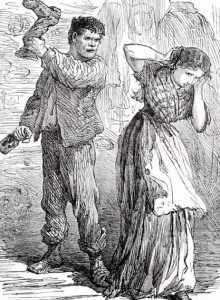
I did manage to get my wife and children out into Parliament Fields before it got dark, and I just got back in time to see the sweep that lived at the top of the court kick his wife into the street, and then throw a shovelful of soot over her, much to the amusement of the gangs of lads that were now coming away from the performance.
The Saturday and Sunday which I spend in that court I always shudder at. I’m very sorry to think that, although we are told the world is getting better, the Liverpool courts are getting no better.
